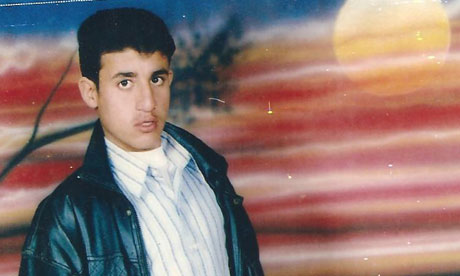British servicemen suspected of murdering Iraqi civilians
Exclusive: Soldiers and airmen are suspected of killing significant number of civilians, but have not been put on trialIan Cobain
Sunday 12 September 2010 16.17 BST

Said Shabram, who drowned after British soldiers allegedly pushed him from a jetty into the Shatt al-Arab waterway near Basra.
British soldiers and airmen are suspected of being responsible for the murder and manslaughter of a number of Iraqi civilians in addition to the high-profile case of Baha Mousa, defence officials have admitted.
The victims include a man who was allegedly kicked to death on board an RAF helicopter, another who was shot by a soldier of the Black Watch after being involved in a traffic incident, and a 19-year-old who drowned after allegedly being pushed into a river by soldiers serving with the Royal Engineers.
Military police recommended that some of the alleged killers be put on trial for murder and manslaughter, but military prosecutors declined to do so after concluding that there was no realistic prospect of convictions. The Ministry of Defence and the Service Prosecuting Authority (SPA) have repeatedly declined to offer detailed explanations for those decisions. The MoD has also been reluctant to offer anything other than sketchy details of some of the investigations.
In the case of the man said to have been kicked to death aboard an RAF helicopter by troops of the RAF Regiment, the MoD has admitted that the allegation was investigated by RAF police, who decided not to conduct any postmortem examination of the body. After the case was referred to the RAF's most senior prosecutor, a decision was taken not to bring charges, apparently because the cause of death remained unknown. MoD officials are refusing to say whether any of the alleged killers were ever interviewed as part of the investigation. They did admit, however, that the British military has made no attempt to contact the man's family since his death.
The disclosure that British servicemen are suspected of being involved in the unlawful killing of a significant number of Iraqi civilians comes after the high court gave permission for a judicial review of the MoD's failure to establish a public inquiry into the British military's entire detention policy in the wake of the 2003 invasion.
An army investigation into a number of cases – including that of Mousa, who was tortured to death by British troops – conceded in 2008 that they were a cause for "professional humility", but concluded that there was nothing endemic about the mistreatment.
In July, however, after reviewing evidence submitted by lawyers representing 102 survivors of British military detention facilities, the high court ruled: "There is an arguable case that the alleged ill-treatment was systemic, and not just at the whim of individual soldiers." The court also cast doubt on the ability of military police to conduct independent investigations.
The abuse documented by a team of lawyers led by Birmingham solicitor Phil Shiner includes 59 allegations of detainees being hooded, 11 of electric shocks, 122 of sound deprivation through the use of ear muffs, 52 of sleep deprivation, 131 of sight deprivation using blackened goggles, 39 of enforced nakedness and 18 allegations that detainees were kept awake by pornographic DVDs played on laptops.
The incidents which led to British servicemen being suspected of murder or manslaughter came shortly after the invasion, at a time of growing chaos and lawlessness in Iraq.
The RAF case concerns the death of a man called Tanik Mahmud, who was detained at a checkpoint at Ramadi in western Iraq on 11 April 2003 for reasons that the MoD has repeatedly declined to disclose. He and a number of other detainees were put aboard a Chinook helicopter, and guarded by three men from the 2nd Squadron of the RAF Regiment.
The MoD says that Mahmud "sustained a fatal injury" while on board the aircraft, but maintains that it does not know what sort of injury this was. On the Chinook's arrival at a US air base, Mahmud's body was examined by a US military doctor, who declared the cause of death to be unknown.
The MoD says that an RAF police investigation was opened two months later following a complaint that the three men from the RAF Regiment "had kicked, punched or otherwise assaulted" Mahmud. According to the MoD's account, the RAF investigators waited a further 10 months before asking a pathologist whether it was worth conducting a postmortem examination. According to the RAF investigators, this pathologist advised them that Mahmud's body would be too decomposed for an examination to be worthwhile. The MoD would not say whether the pathologist was an RAF officer.
TBC..

 Forum
Forum

 Home
Home 

 Album
Album 

 Help
Help

 Search
Search

 Recent
Recent 

 Rules
Rules 

 Login
Login

 Register
Register





 Pages: 1
Pages: 1

